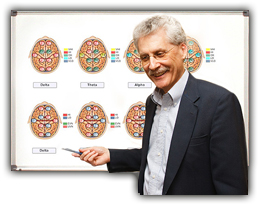
By Richard Soutar, Ph.D.
Email: support@newmindacademy.com
This course from NewMind Academy is presented to avail clinicians the opportunity to learn in depth the complexities of alpha theta training. Our goal is to ensure that practitioners feel well informed and competent enough to begin utilizing this most valuable and underused technique in Neurofeedback upon completion of the workshop. We will offer hands on experience as well as the opportunity to engage in an ongoing mentoring process to support what attendees have learned.
Educational Objectives:
The educational objectives of this course follow the outline of BCIA's core requirements that can be viewed at the BCIA website www.bcia.org.
It satisfies the requirement for 16 CE hours as outlined below.
| 1 | I | Introduction to EEG Biofeedback- History |
| 1 | III | Basic Neurophysiology and Anatomy |
| 1 | I | EEG & Electrophysiology |
| 2 | V | Instrumentation |
| 5 | VII | Treatment Planning |
| 4 | VIII | Other Therapeutic Techniques |
| 2 | IX | Professional Conduct |
Prerequisite for Participation:
Participants seeking CE hours to be applied toward BCIA for this workshop should already be certified and have clinical experience. This workshop will be at an intermediate to advanced level. Prior experience in counseling or coaching will be very helpful toward understanding this special modality of neurofeedback. Participants not seeking certification may participate if they have an interest in EEG Biofeedback as a practitioner, staff, or student with an interest in expanding their knowledge of EEG Biofeedback.
Cancellation Policy:
Cancellation Policy:- No returns, refunds, exchanges after May 15th, 2008.
History of Alpha Theta: Key Players:
Elmer Green: Theta Training
Penniston & Kulkosky: Using Alpha To Get To Theta
Nancy White & Dale Walters: The Refinement of The Technique
Bill Scott: Reducing Abreactions & Recent ResearchTheory Behind Alpha Theta:
Liminal States & Arousal Theory
Mental Rehearsal: Programming The Unconscious Rescripting
Memory Encoding Frequencies: State & Context Dependent Memory
Reducing Internal Chatter: Profound Attention
Crossovers: Fact or Fiction
Hypnogogic Images vs Visualizations
Using Alpha to Generate Theta
Systematic Desensitization
Transpersonal Psychology: Insight TrainingThe Nature of Trauma:
The Neurophysiology of Trauma
Neurochemistry & Trauma
Electrophysiology of Trauma
Networks of TraumaCandidates For Alpha Theta:
Anxiety & PTSD Best
Problems With ADD
Problems With DepressionPracticum:
Setting up Your Computer For Alpha Theta
Visualization TechniquesLunch
The Training Progression:
Implementing the Protocol
Peripheral Pre-Training
Cognitive Preparation
Implementing Visualizations
Managing Crossovers
Post Session Integration
Typical Progression of Sessions
Number of Sessions RequiredAbreactions & Other Complications:
The Nature of Abreaction: Memory Networks
Retraumatization or Resolution
The Issue of Suffering
The Role of The Therapist’s IssuesWhen it Doesn’t Work:
The Importance of Social ContextPracticum:
A Typical Alpha Theta Session
Visualization Techniques
Post Session Interview Techniques
Brief History of Meditation:
Sources in Religious Traditions
Hindu vs Buddhist Approaches
TM vs Relaxation ResponseThe Types of Meditation:
The Meditation Traditions
Access State & Concentration
Mindfulness
Other StatesResearch On Meditation:
Physiological Research
EEG Research
EEG Model Of MeditationUsing Neurofeedback to Assist:
Physiological Pre-Training: Breathing & HRV
Protocols & Frequencies To Use
NeuromonitoringBlocks To Meditation:
Anxiety, Depression, & Disorder
Western Cultural Bias
Lifestyle Issues
Ethical IssuesPracticum:
Setting Up Your Computer For NeuroMeditation
Personal NeuroMeditation SessionLunch
Practicum II:
Confounds & Technical Issue